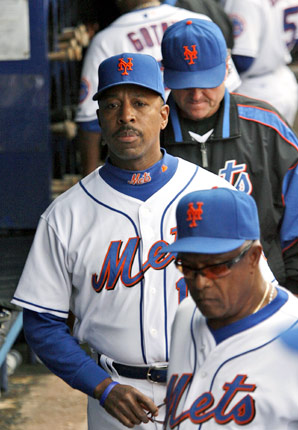Mets officially an amazin' disgrace
Go down the Mets' organizational chart and you would probably reach the grounds crew before you found an aspect of the operation that is working properly. Every organizational decision seems to be approached the way shortstop Jose Reyes has been handling ground balls this season -- tentatively, with a high likelihood of error. Even if you could care less about the Mets' won-loss record, the sheer, all-encompassing ineptitude in the franchise's latest moves is worth your notice.
It all came to a head Monday night, with the Midnight Massacre, Pacific Daylight Time version. The Mets were in Anaheim, having just finished a 9-6 victory over the Angels for their third win in four games, when general manager Omar Minaya fired Randolph, pitching coach Rick Peterson and first-base coach Tom Nieto (who must be thinking, "Wait, how is this my fault?"), in a move that everyone had seen coming for weeks. It was after 3 a.m. back in New York when the news was released, which suggests that Minaya and his father-son bosses, Fred and Jeff Wilpon, thought they could somehow sneak this past the media under cover of darkness.
Apparently no one informed the Mets executives that this is 2008, not 1968. There's a little thing we like to call the Internet these days, creating a 24-hour news cycle, and releasing bad news late at night is an antiquated PR strategy. It doesn't mean reporters are stuck because they've missed tomorrow's edition. If the Mets were trying to lessen the media hit, they achieved exactly the opposite, since the news was being circulated through cyberspace within minutes of its release, along with well-deserved attacks from all corners on the callousness and absurdity of the timing. Instead of firing Randolph and his colleagues after the Mets split a doubleheader at home against Texas on Sunday, Minaya allowed them to fly 3,000 miles across the country only to whack them in the wee hours once they got there.
Minaya's explanation for the late-night firing was weak -- he said he didn't make the decision until that evening, and he couldn't wait until the next morning to inform Randolph because the news might have leaked out first. He didn't explain who could have leaked the news of his decision if only he knew of it, or why he suddenly came to the realization Monday night that Randolph had to be fired as opposed to anytime in the last month, while his manager had been twisting in the wind.
Here's the more likely scenario: Randolph sealed his fate several weeks ago, when he wondered aloud whether race was a factor in the animosity toward him, linking himself to other black New York coaches who had been treated roughly by the media, like the Jets' Herman Edwards and, the unbelievably inept Thomas of the Knicks. Even worse, Randolph criticized the team-owned TV network, SNY, for not using its cameras to show him in the best light in the dugout during games. The Wilpons, incensed by this, called him on the carpet for a toungue-lashing but Minaya was able to temporarily fend off their desire to fire him. But when the Mets continued to struggle, Minaya's hand was forced. The problem was that the Mets won two of three from Texas over the weekend, which, coupled with the fact that it would have looked even worse to fire him Sunday on Father's Day, meant Randolph had to be allowed to start the West Coast trip. But the Mets won Monday, giving them three wins in four games, and had their ace, Johan Santana, pitching on Tuesday, which raised the possibility of (horrors!) an actual winning streak. Minaya, knowing what his bosses wanted, finally decided that Randolph had to get the axe before that could happen. That's right, it was important to jettison Randolph because there was a chance he might start winning. Those are your New York Mets, ladies and gentlemen. They don't call them amazin' for nothing.
The shame of it is that on balance, Randolph didn't deserve to be fired. The focus has been on the Mets' historic collapse last season, which has obscured the larger truth that only Davey Johnson had a more successful tenure than Randolph's three-plus seasons, in which the Mets were 302-253. The year before he arrived in 2004, the team was 71-91. Two years later they were 95-67 and fell one game short of the World Series. Last season they led the NL East virtually the entire season and were 83-62 with a seven-game lead in mid-September. Then came the 5-12 finish that cost them the division, but it took a 13-4 stretch run by the Phillies to nip them by a game. If the Phils had been anything less than sensational over the final 17 games, the Mets would have won the division and Randolph would almost certainly still be the manager.
It's hard to imagine any manager could have done better than Randolph's 34-35 record this season, given everything that has gone wrong for the Mets, including Church's concussions, Moises Alou's injuries and inconsistent performances from their three main offensive weapons, Reyes, Carlos Beltran and David Wright. (Randolph's replacement, Jerry Manuel, just might benefit from some of those players finding their normal levels.) But there is always panic in the streets, often premature, when a New York team struggles -- just ask Tom Coughlin and the football Giants.
It takes a strong organization to ride out the pressures that New York can bring to bear when a team is struggling. There has to be leadership from within and an ability to make wise, well thought out decisions that take the big picture into account. Does that description bring the New York Mets' organization to mind? Didn't think so.





